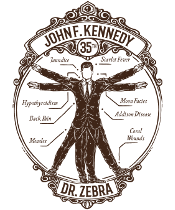

Health and Medical History of President
Thomas JeffersonLived 1743-1826
Health and Medical History of President
Thomas JeffersonLived 1743-1826
1776-1783
1812-1815
1846-1848
1861-1865
1898-1899
1917-1918
1941-1945
1950-1953
1964-1975
1990-1991
2001-2021

- Violent headache for two days after behaving awkwardly in front of a girl he fancied (March 1764, age 20);
- Six week headache after his mother's death on March 31, 1776;
- Six weeks of headache soon after arriving, unhappy and homesick, as minister to France in 1785;
- While overburdened as Secretary of State, headaches recurred when he learned that a friend had become ill, but recovered (April 1790);
- About this time he had a second set of headaches, lasting from sunrise to sunset each day for 6 weeks.
One account described the fracture as compound and poorly treated by the Parisian doctors. The wrist remained swollen, painful, and useless for weeks 1e. Despite taking the waters at Aix-en-Provence, it remained deformed and bothered him the rest of his life 1f.
In 1818 he had his most severe attack of rheumatism ever. It was accompanied by life-threatening constipation. 1h. Taking the waters at Warm Springs, VA helped the rheumatism 1g.
Jefferson's strength declined further in winter 1822, but he remained in generally good health. (He dreaded the winters at this age.) He could walk "only [to] reach my garden, and that with sensible fatigue" 1h.
- As he aged, his red hair turned sandy, then white 2a.
- He did not use tobacco in any form 2c.
- Jefferson started the custom of a President shaking hands, rather than bowing, to greet guests 4a.
- The following description of Jefferson is a reminder that medical skills in that era were not always restricted to medical people: "He was a gentleman of thirty-two who could calculate an eclipse, survey an estate, tie an artery, plan an edifice, try a cause, break a horse, dance a minuet, and play the violin" 5a.
- No significant illness as infant or child 1j.
- Bumgarner quotes at length from a letter in which Jefferson gave his views on physical fitness
1k.
Jefferson encouraged exercise, walking and shooting most of all, observing: "Games played
with the ball and others of that nature are too violent for the body." Although a dedicated
scholar, Jefferson advocated time to exercise even though it meant interrupting study, warning:
"Health must not be sacrificed to learning."
Unfortunately, it appears that Jefferson's fondness for shooting damaged his hearing (see above).
- Writing to a physician in 1819
1c,
Jefferson described his health and health habits, including:
- Ate little animal meat. Vegetables were his principal diet.
- Drank 3 glasses of wine a day, but "halved the effects" by drinking only the weak wines. Did not drink "ardent wines" nor "ardent spirits" in any form. He did consume "malt liquers and cider" as his "table drink."
- Slept from 5 to 8 hours nightly. Always rose with the sun.
- Had few chest colds (every 8 to 10 years). Partially ascribed this fact to his habit of bathing his feet in cold water every morning.
- Had a fever of longer than 24 hours "not above three or four times in my life."
- Jefferson was no fan of the doctors, to the point where he would look upwards for a buzzard
whenever he saw three physicians together
1l.
He especially distrusted the practice of bleeding and purging
1l.
But Jefferson was not above practicing medicine himself. His "practice" included: suturing the wound of a severely bleeding slave, inoculating his family against smallpox (see above), and treating his daughter's typhoid fever (with Madeira wine) 1d. He used the Madeira regimen on dozens of his neighbors as well 1m.
- Through his mother's father, Jefferson could claim descent from King Edward I of England 6a.
- Bumgarner, John R. The Health of the Presidents: The 41 United States Presidents Through 1993 from a Physician's Point of View. Jefferson, NC: MacFarland & Company, 1994.
 a pp.16-17 b p.21 c p.23 d p.19 e p.20 f pp.20-21, 23 g p.22 h p.24 i p.25 j p.16 k p.17 l p.18 m p.19-20
a pp.16-17 b p.21 c p.23 d p.19 e p.20 f pp.20-21, 23 g p.22 h p.24 i p.25 j p.16 k p.17 l p.18 m p.19-20Comment: Devotes one chapter to each President, through Clinton. Written for the layperson, well-referenced, with areas of speculation clearly identified, Dr. Zebra depends heavily on this book. Dr. Bumgarner survived the Bataan Death March and has written an unforgettable book casting a physician's eye on that experience.
- Hall, Donald (ed.). The Oxford Book of American Literary Anecdotes. Oxford: Oxford, 1981.
a p.23 b p.25 c p.24
- Ledgin, Norm. Diagnosing Jefferson: Evidence of a Condition that Guided his Beliefs, Behavior, and Personal Associations. Arlington, TX: Future Horizons, 2000.
- Stern, C. C. Braddock's Presidential Trivia. 3rd edition. Herndon, VA: Braddock Communications, Inc., 2001.
a p.3
- Dallek, Robert. An Unfinished Life: John F. Kennedy 1917-1963. Boston: Little, Brown, 2003.
 a p.327
a p.327 - Montgomery-Massingberd, Hugh (ed). Burke's Presidential Families of the United States of America. 2nd ed. London: Burke's Peerage Limited, 1981.
 a p.111
a p.111Comment: Maps -- in great detail -- the ancestors and descendants of American presidents through Ronald Reagan. They would have had an exhausting time with President Obama's family tree! MORE




















